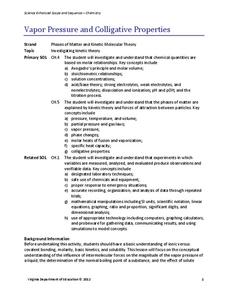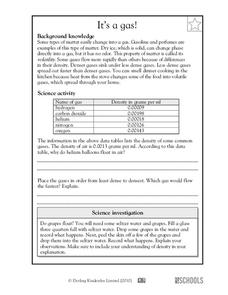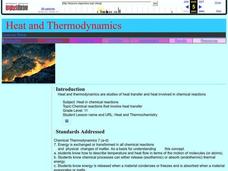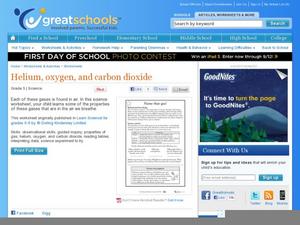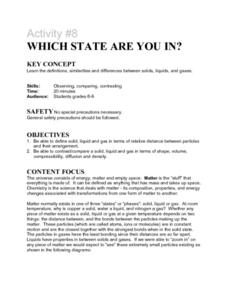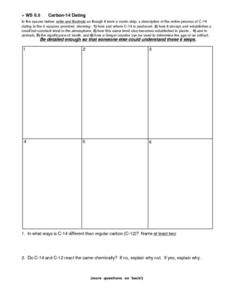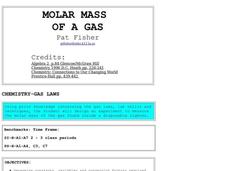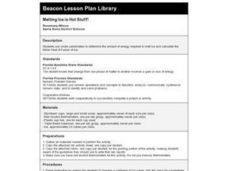Virginia Department of Education
Partial Pressure
At some point, everyone has been under pressure—even Dalton! Explore Dalton's law of partial pressures with young chemists as they measure the volume of air extracted from a sample compared to its original volume. Class members perform...
Virginia Department of Education
Vapor Pressure and Colligative Properties
Hate to vacuum, but enjoy using a vacuum pump? Explore a lesson plan that starts with a demonstration of boiling water at various temperatures by using a vacuum pump. Then scholars design their own experiments to measure vapor pressure...
Curated OER
It's A Gas!
Fifth graders complete a worksheet which has them place a list of gases in order from the least to the most dense. The density in grams is given for each. There's a good paragraph which provides background knowledge about the volatility...
Curated OER
Heat and Thermodynamics
This is actually a 10-day mini unit on thermal energy for your high school chemists. Every avenue is taken to get learners absorbed in heat: a pretest, a PowerPoint presentation, Internet exploration, demonstrations, lab activities, and...
Curated OER
Name That Gas!
Young scientists discover that air is a mixture of different gases - mainly nitrogen and oxygen. The properties of some of the other gases found in oxygen are listed in a table, then learners must decide which one of those gases is...
Curated OER
Which Brand of Air Freshener is Most Cost Effective?
Students use scientific method to determine cost-effectiveness of air freshener, and create PowerPoint presentations to share their results.
Curated OER
Transfer of Thermal Energy
Students define temperature and heat, distinguish between temperature and heat flow, calculate amount of heat energy released or absorbed in chemical process, and design procedure, through experimentation, to gather and evaluate data to...
Curated OER
Rock On!
Fourth graders make models of igneous, metamorphic, and sedimentary rocks out of different types of candy and cookies.
Curated OER
Heating Curve Lab
Tenth graders examine the heating curve of water when head is added constantly over time. They input values into a calculator as they record water temperature every thirty seconds as it is heated on a hot plate. They complete the...
Virginia Department of Education
The Colligative Properties of Solutions
How can you relate colligative properties of solutions to everyday situations? Pupils first discuss the concepts of density, boiling and freezing points, then demonstrate how to accurately determine the boiling and freezing point of...
Curated OER
Activity #8 Which State Are You In?
Middle schoolers define, give similarites and differences between solids, liquids, and gases. They compare and contrast a solid, liquid and gas in terms of shape, volume, compressibility, diffusion and density. Pupils classigy common...
Curated OER
Carbon-14 Dating
In this carbon dating worksheet, students write and illustrate a comic strip describing the entire process of C-14 dating. Then students complete 6 short answer and 2 fill in the blank questions.
Curated OER
Survival Science: How Evaporation and Condensation Can Save Your Life!
Eighth graders demonstrate how scientific principles can be used to provide resources in an emergency situation. In this evaporation lesson students view a demonstration on a solar still and see a brief PowerPoint presentation.
Curated OER
Nuclear Reactions
In this nuclear reaction worksheet, students determine the missing particle from the reaction and then name that particle. This worksheet has 18 problems to solve.
Curated OER
Molar Mass
Students apply the ideal gas law and Dalton's Law of Partial Pressure to develop an experiment which determine the molar mass of butane from disposable lighters. In small groups, they develop a procedure and have it approved before...
NorthEast Ohio Geoscience Education Outreach
Density and Pressure of a Hot Air Balloon
Using a dry cleaner bag and a blow dryer, create a hot air balloon! The materials list suggests obtaining one dry cleaner bag per student, but since this is probably inconvenient, consider doing this as a demonstration during a lesson on...
Curated OER
The Biogeochemical Cycles
The majority of this presentation is a collection of diagrams and graphs that back your lecture on biogeochemical cycles. The last few slides define ecosystems and the Gaia hypothesis. You may find these slides valuable, but will...
Curated OER
Frost Depth
Learners explore the concept of frost depth. In this frost depth lesson, students conduct a scientific investigation that requires them to use a frost tube to measure, record, and graph frost depth data.
Curated OER
Applying the Gas Laws
For this gas laws worksheet, students solve eleven problems using the various gas laws to find temperature, pressure, and volume of gases.
Curated OER
Melting Ice is Hot Stuff!
Fourth graders determine the amount of energy required to melt ice using a calorimeter. They calculate the Molar Heat of Fusion of Ice.
Curated OER
Solution Shapes
In this solutions worksheet, students soak a pipe cleaner in hot water and a supersaturated solution of 20 Mule Team Borax. Kids leave their pipe cleaner in the solution for 30 minutes and then observe. They put it back in over night and...
Curated OER
Water Vapor Equilibrium
In this chemistry worksheet, students complete 12 short answer questions and problems on water vapor equilibrium. They calculate equilibrium concentrations of reactants and products.
Curated OER
Rites of Passage
Students explore coming of age ceremonies. In this rites of passage lesson, students research spiritual, religious, and secular child and adolescent rites of passage rituals. Students design personal rites of passage.
Curated OER
Vapor Pressure
In this vapor pressure worksheet, learners use a given graph of the vapor pressure of four liquids to answer eleven questions. They compare and find boiling points and vapor pressures of propanone, ethanol, water, and ethanoic acid.
Other popular searches
- Phase Changes of Matter
- Phase Changes in Matter
- Phase Changes Matter
- Phase Change in Matter
- Change of Phase of Matter



